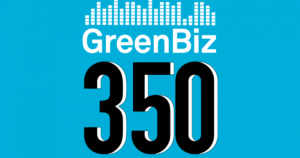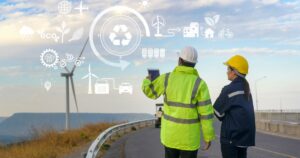
Every July, a portal into the future opens. The near future. Say, one to three years out.
During this time of year, we look into that near-future-portal — the database of more than 500 proposed speakers to our February GreenBiz conference — and patterns, distinct from prior years, emerge. We see what the corporate sustainability ecosystem will be talking more and more about next.
I don’t mean decarbonization, data or climate tech, and I don’t mean supply chain issues, nature, Scope 3 emissions or DEI. Those make up the current canon of corporate sustainability priorities, whether your company has a sophisticated sustainability strategy or is just getting started. Combined, they were mentioned more than 1,500 times throughout proposed session descriptions — I ran the write-ups through an online word-frequency counter.
Those topics will certainly be covered at GreenBiz in February, but they were likely once first glimpsed through this proposal season wrinkle-in-time trick in prior years.
Here is a look at what’s just now hitting the Top 40 charts for the first time. It’s a non-exhaustive selection of topics that represent a view to the future of rising risks and opportunities that senior sustainability executives and rising stars are starting to grapple with and want to present or talk about with peers.
What you should have on your radar
Mining and critical minerals
Our applicants have tuned in to the challenges around achieving global decarbonization, particularly the energy transition, given it requires critical minerals such as cobalt, lithium, copper and other materials often mined in geopolitically iffy regions.
A sustainability head at Oracle proposes to tease out how the auto industry is achieving traceability of some critical minerals (as well as human rights, carbon and other metrics) at scale using a blockchain platform. Consultancy ERM proposes to bring together reps from mining companies with stakes in critical minerals to talk successes and failures so far in sourcing these materials in response to “customer demand and government incentives like the Inflation Reduction Act (IRA).” Others propose more potentially contentious dialogue: Positive takes on the controversial prospect of deep sea mining, and a celebration of a Nevada lithium mine project in an Endangered Species Act conflict.
Oceans
The proposals we received this season were not only about protecting oceans, but using them. Multiple proposals promote seaweed as a solution. Seaweed-based yarn startup Keel Labs proposes to spotlight the “potential of the ocean to accelerate our planet’s development towards a more sustainable future,” while World Wildlife Fund proposes to “explore whether accelerating a market for seaweed could be a climate change solution.” Another swath of ideas from entrepreneurs position oceans as central to carbon removal.
A wave of ocean plastic-related proposals and other upstream-pollution-related content include a pitch from Dell and HP on “advancing commercially viable and socially-responsible ocean-bound plastics.”
Artificial intelligence
The applications of AI proposed have gone from grand and theoretical to remarkably tactical. UL Solutions proposes a session on “how to write for AI and machine learning readers of ESG reports and communications, as these are the most ‘influential’ readers of ESG reports, parsing and mining company data for raters and rankers.” An SAP proposal promises to show how generative AI can help companies “achieve immediate transparency into their suppliers’ ESG profiles,” and Autocase offered to introduce an AI-assisted online decarbonization planning tool for real estate portfolios.
Justice
This year social justice showed up in more intersectional, and specific, contexts than before, and from more innovators building justice into their business models. Supplements company Ritual pitched a session on identifying and tracking PFAS through the supply chain that would make “explicit intersections between sustainability, human rights, justice and traceability.”
Biomaterials startup erthos proposed to discuss how “the intersections of race, gender, social and economic status, and age influence how we view, engage, and protect our planet.” Startup GreenWealth Energy connected environmental justice and workforce development to public EV charging infrastructure funding by highlighting state and local government programs supporting under-resourced “community involvement in the electrification space.”
Is this everything you should be watching? No chance. Is there a good chance these topics will gain traction in the coming year? I’d bet on it. And if it’s something you should start to pay more attention to to help you do your job, we’ll include it in the GreenBiz 24 program. Speakers and sessions will start to be announced next month.
- SEO Powered Content & PR Distribution. Get Amplified Today.
- PlatoData.Network Vertical Generative Ai. Empower Yourself. Access Here.
- PlatoAiStream. Web3 Intelligence. Knowledge Amplified. Access Here.
- PlatoESG. Automotive / EVs, Carbon, CleanTech, Energy, Environment, Solar, Waste Management. Access Here.
- BlockOffsets. Modernizing Environmental Offset Ownership. Access Here.
- Source: https://www.greenbiz.com/article/future-sustainability-4-fast-emerging-trends
- :has
- :is
- :not
- $UP
- 1
- 24
- 40
- 500
- 8
- a
- About
- accelerate
- accelerating
- Achieve
- achieving
- Act
- advancing
- age
- AI
- an
- analysis
- and
- announced
- Another
- applicants
- applications
- ARE
- around
- article
- AS
- At
- attention
- auto
- BE
- before
- Bet
- between
- blockchain
- blockchain platform
- bring
- Building
- business
- business news
- but
- by
- CAN
- carbon
- Celebration
- central
- certainly
- chain
- challenges
- Chance
- change
- charging
- Charts
- Climate
- Climate change
- combined
- coming
- commercially
- Communications
- community
- Companies
- company
- Conference
- conflict
- connected
- consultancy
- content
- contexts
- controversial
- Copper
- Corporate
- could
- covered
- critical
- Current
- customer
- data
- Database
- decarbonization
- deep
- dei
- Dell
- Demand
- Development
- dialogue
- discuss
- distinct
- do
- Dont
- Economic
- ecosystem
- emerge
- Emissions
- energy
- engage
- entrepreneurs
- environmental
- ESG
- estate
- Ether (ETH)
- EV
- everything
- executives
- explore
- far
- February
- First
- first time
- For
- Free
- from
- fund
- funding
- future
- Gain
- Gender
- generative
- Generative AI
- geopolitically
- getting
- given
- glimpsed
- Global
- gone
- good
- Government
- Have
- head
- help
- highlighting
- hitting
- How
- How To
- HP
- HTTPS
- human
- human rights
- i
- ideas
- identifying
- if
- immediate
- in
- Incentives
- include
- industry
- inflation
- influence
- Infrastructure
- innovators
- interested
- into
- introduce
- involvement
- IRA
- issues
- IT
- Job
- jpg
- July
- just
- Justice
- Labs
- latest
- learning
- like
- likely
- lithium
- local
- Local Government
- Look
- machine
- machine learning
- make
- Market
- materials
- mean
- mentioned
- Metrics
- mined
- minerals
- Mining
- Mining Companies
- models
- Month
- more
- most
- multiple
- Nature
- Near
- news
- Newsletter
- next
- no
- node
- now
- ocean
- oceans
- of
- offered
- often
- on
- once
- ONE
- online
- only
- opens
- opportunities
- or
- oracle
- Other
- Others
- our
- out
- particularly
- patterns
- Pay
- Pitch
- pitched
- planet
- planning
- plastics
- platform
- plato
- Plato Data Intelligence
- PlatoData
- Portal
- portfolios
- position
- positive
- potential
- potentially
- present
- Prior
- Profiles
- Program
- Programs
- project
- promises
- promote
- proposal
- Proposals
- propose
- proposed
- proposes
- prospect
- protect
- protecting
- public
- Race
- readers
- real
- real estate
- received
- reduction
- regions
- removal
- Reports
- represent
- requires
- response
- rights
- rising
- rising stars
- risks
- sap
- say
- Scale
- scope
- SEA
- Season
- see
- selection
- senior
- session
- sessions
- should
- show
- showed
- So
- so Far
- Social
- social justice
- solution
- Solutions
- some
- something
- sophisticated
- Sourcing
- Space
- speakers
- specific
- Spotlight
- Stars
- start
- started
- Starting
- startup
- State
- Status
- Strategy
- such
- suppliers
- supply
- supply chain
- Supporting
- Sustainability
- sustainable
- sustainable future
- tactical
- takes
- Talk
- talking
- tech
- than
- that
- The
- The Future
- their
- Them
- theoretical
- There.
- These
- they
- this
- those
- three
- Through
- throughout
- time
- times
- to
- together
- tool
- top
- Topics
- towards
- Traceability
- Tracking
- traction
- transition
- Transparency
- Trends
- using
- viable
- View
- want
- watching
- Wave
- we
- weekly
- WELL
- were
- What
- whether
- while
- Wildlife
- will
- with
- Workforce
- Workforce Development
- world
- would
- write
- year
- years
- you
- Your
- zephyrnet






